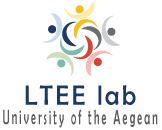Doctoral Program
(PhDs)
LTEE laboratory has designed and appy a Doctoral Degree Program of Study, structured on a mixture of specific seminars, PhD students’ days, PhD students’ conferences and a variety of research-based and education-based activities.
Doctoral candidates should:
- Follow the specific Calls for PhDs Candidates of the Sciences of Pre-Primary Education and of Educational Design Department, and/or
- Contact directly the Faculty members of LTEE lab for more detailed information
PhDs supervised by the Faculty members of LTEE lab:
Dr. Prantsoudi Stavroula
Prantsoudi S. (2022). Investigating factors affecting teachers’ intention to integrate Computational Thinking into educational practice by applying the technology acceptance model, PhD Thesis, University of the Aegean.
Dr. Markouzis Dimitris
Markouzis D. (2021). Design and implementation of mobile augmented reality serious games and study of their effect on the spatial ability development, PhD Thesis, University of the Aegean.
Dr. Vaitsidi Georgia
Vaitsidi G. (2021). Inquiry based plane surface measurement by students in 5th grade, PhD Thesis, University of the Aegean.
Dr. Skandalaki Emmanouela
Skandalaki E. (2017). The role of informative representations in mathematical problem solving, PhD Thesis, University of the Aegean.
Dr. Noulis Ioannis
Noulis I. (2014). An investigation of multiplicative reasoning of children with Asperger syndrome, PhD Thesis, University of the Aegean.
Dr. Mokos Evagelos
Mokos E. (2012). An investigation of metacognitive functions during the solution of mathematical problems for pupils 10-11 years old, PhD Thesis, University of the Aegean.
Dr. Kritikos Georgios
Kritikos G. (2013). Analogical reflection and metacognitive skills development through collaborative modelling activities in Physics, PhD Thesis, University of the Aegean.
Dr. Petrou A. Argyroula
Petrou A. (2010). Study of the effects of technology based collaborative learning activities to students with corporal disabilities. Use of synchronous and asynchronous communication tools during Computer Science Courses in Secondary Education, PhD Thesis, University of the Aegean.
Dr. Bratitsis Tharrenos
Bratitsis T. (2007). Development of flexible supporting tools for asynchronous discussions by analyzing interactions among participants, for technology supported learning, PhD Thesis, University of the Aegean, (p. 630).
Dr. Ioannidou Irini
Ioannidou I. (2007). The effect of collaborative activities with the use of wireless technological environment to spatial concepts learning, PhD Thesis, University of the Aegean, (Vol.1, 680p; Vol.2, 346 p.)
Dr. Chaviaris Petros
Chaviaris P. (2006). Types of socio-mathematical interaction in mathematics classroom: observing videotaped sessions and playing roles as environments for students’ reflection, PhD Thesis, University of the Aegean, (Vol1. p.329; Vol.2. p.82)
Dr. Hlapanis George-Henry
Hlapanis G.-H. (2006). Creating Learning Communities by using Communication Technologies: The Case Study of a Distance Learning Educational program, concerning further Training of Teachers in the use of Information and Communication Technology in Education, PhD Thesis, University of the Aegean
Dr. Petrou-Bakiri Argyro
Petrou_Bakiri A., (2005) Teachers’ roles and strategies during educational exploitation of technological environments that support collaborative learning in real school context, PhD Thesis, University of the Aegean, (p.404)
Dr. Orfanos Stelios
Orfanos S. (2005): Modelling activities for teaching physics, with exploitation of technological learning environments, PhD Thesis, University of the Aegean, (Vol.1., p.357; Vol.2, p.120)
Dr. Kapelou Ekaterini
Kapelou A. (2004). Didactical situations of arithmetical concepts for children 5-6 years: underlining the multiplicative structures, PhD Thesis, University of the Aegean, (p.292)
Dr. Stathopoulou Chariklia
Stathopoulou Ch.(2003). The connection between cultural context and teaching and learning of mathematics, PhD Thesis, University of the Aegean, (p.355)
Dr. Orfanos Stavros
Orfanos S. (2003): The importance of heterogeneous reasoning in learning and teaching relations and operations with fractions, PhD Thesis, University of the Aegean, (p.160)
